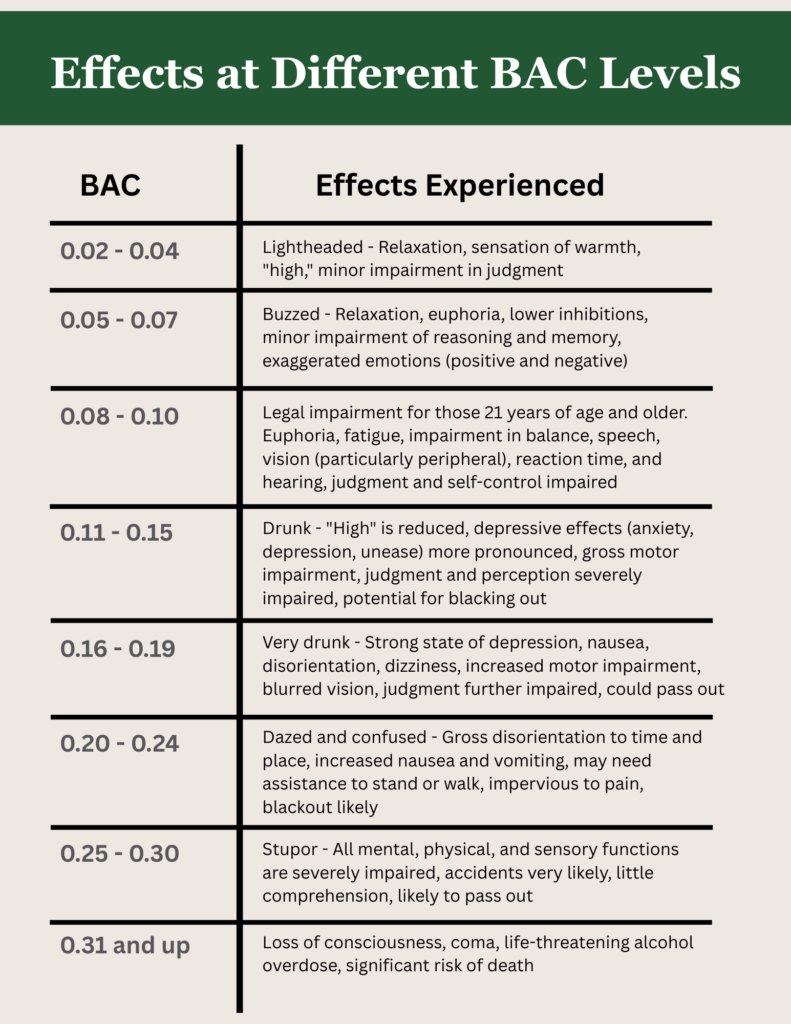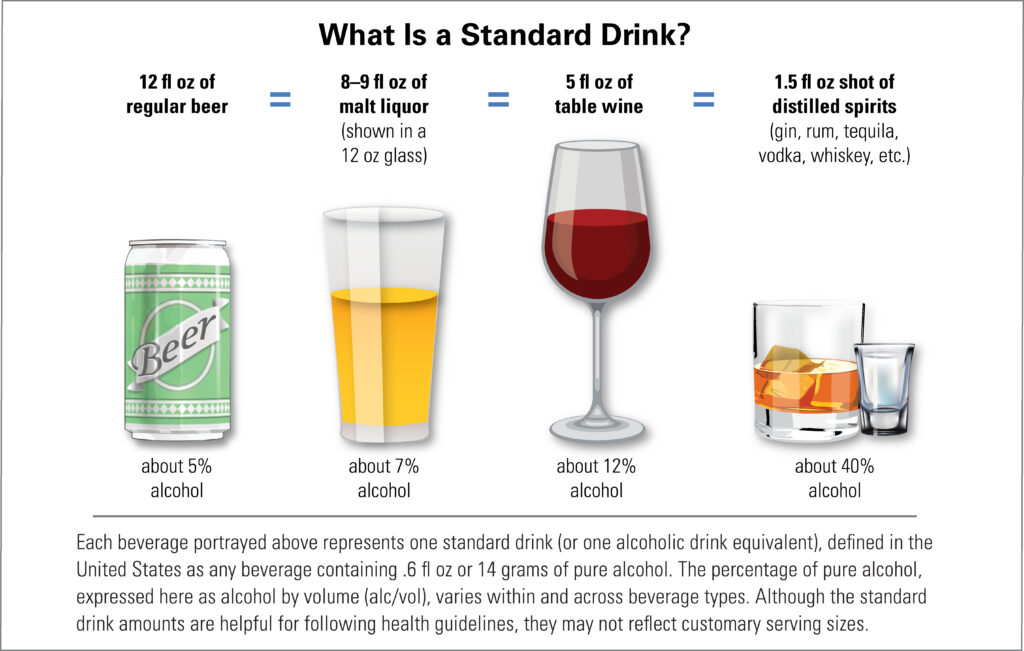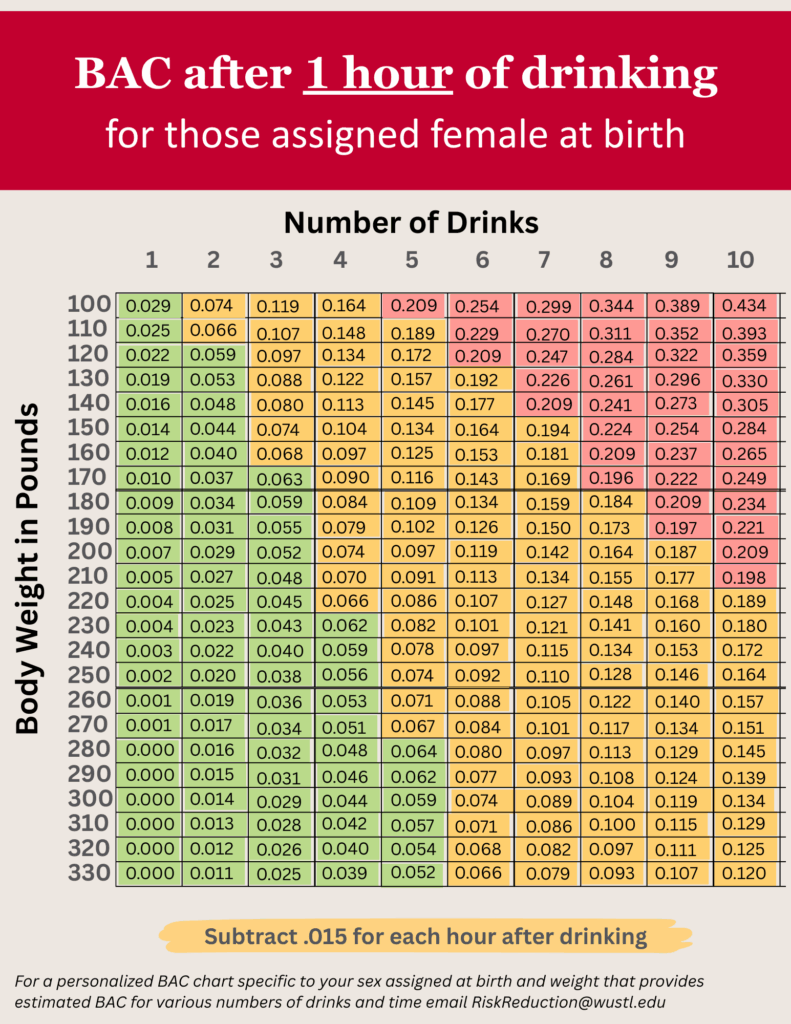What’s a good drinking limit? How much alcohol is too much? The answer- it depends. There are many factors that impact a person’s experience with alcohol. If you choose to drink, you can reduce your risk of an alcohol-related problem and still have fun with just a little education.
*Please note, the legal drinking age in Missouri is 21.
Blood Alcohol Concentration (BAC) & impairment
BAC is a measurement of how much alcohol is in a person’s bloodstream
BAC indicates how impaired a person is from drinking
Factors that impact BAC:
If a person drinks on an empty stomach, the alcohol will be absorbed into their bloodstream faster. This results in a sudden spike in BAC.
The faster a person drinks, the quicker their BAC will rise. This is because the liver needs time to process the alcohol out (about one hour per standard drink). Drinking games can be dangerous, as they encourage individuals to drink a lot of alcohol in a short amount of time.
Those assigned female at birth tend to have a higher BAC than those assigned male at birth, even if they drink the same amount of alcohol. Please note, assigned sex at birth is used only to help determine BAC and how alcohol may affect your body based on physiology. This may differ from your gender/gender expression.
Unfortunately, there is not adequate research at this time to help us understand how taking hormones as part of a gender-affirming process may impact an individual’s experience of alcohol’s effects. For all individuals, we recommend speaking with your doctor for personalized information about the impact of substances on your body.
People who weigh less will have a higher BAC than those who weigh more, even if they drink the same amount of alcohol.
Note: A person can develop a tolerance to alcohol. This means a person would need to drink more alcohol to feel the effects they used to feel. Tolerance can be dangerous, as BAC still rises at the same rate even if a person doesn’t feel the effects.
The following represents predictable effects we’d expect to see at different BAC levels. See the next section to estimate your BAC.

Staying in the Green
Staying in the Green means keeping your Blood Alcohol Content (BAC) at 0.06 or lower. In a nutshell, at this BAC, people are more likely to experience what they may like about drinking, and less likely to experience what they don’t like. At a BAC of 0.06 or lower, a person is more likely to experience a buzz and feel relaxed/social and is less likely to experience a hangover and doing/saying something they may regret.

The charts at the end of this section can be used to help estimate what drinking limit would keep you in the Green!
These charts are most accurate when entering number of standard drinks consumed. A standard drink refers to an alcoholic beverage that contains 0.6 fluid ounces of pure alcohol. See the image below for examples of what a standard drink looks like.

Not all alcoholic beverages fit into the above categories; some products contain higher concentrations of alcohol. To calculate the standard drink size for different alcohol products outside of the concentrations below, you can use this calculator.


*Assigned sex at birth is used only to help determine BAC and how alcohol may affect your body based on physiology. This may differ from your gender/gender expression. Unfortunately, there is not adequate research at this time to help us understand how taking hormones as part of a gender-affirming process may impact an individual’s experience of alcohol’s effects.
For all individuals, we recommend speaking with your doctor for personalized information about the impact of substances on your body.
Additional Limit Setting Guidance
Moderate drinking consists of 2 drinks or less on a day someone drinks for individuals assigned male at birth and 1 drink or less on a day someone drinks for individuals assigned female at birth
It is recommended to avoid binge drinking to limit your risk of adverse outcomes such as riskier sexual behaviors, accidents/injuries, and organ damage over time. Binge drinking is considered a riskier form of drinking, in which a person consumes enough alcohol to reach a Blood Alcohol Concentration (BAC), of 0.08% or more. This typically occurs:
- For individuals assigned female at birth- after consuming 4 or more drinks in a 2-hour period
- For individuals assigned male at birth- after consuming 5 or more drinks in a 2-hour period.
Lower-risk drinking tips
Reduce your risk of experiencing an alcohol-related problem:
| Set a limit in advance | |
| Keep track of how much you are drinking (ex: use an app, self-texts, etc.) | |
| Stick close to 1 standard drink/hour to have time to feel the effects and process some of the alcohol out | |
| Alternate booze with non-alcoholic beverages to help pace yourself and stay hydrated | |
| Practice saying “no” for when you’ve reached your limit | |
| Eat before drinking – if you haven’t eaten recently, drink less alcohol | |
| Plan a 100% sober ride in advance- a rideshare or a designated driver who has consumed no alcohol | |
| Avoid mixing alcohol with other drugs, including cannabis. Consuming alcohol and cannabis together or in close proximity of each other can amplify aspects of both; the effects can be unexpected | |
| Avoid accepting drinks you don’t know what’s in it or limit the number of drinks when you are unsure of the alcohol content (includes drinks from bars and restaurants) | |
| If you’ve noticed it takes more to feel the effects, take a break from drinking (usually a few weeks to reset tolerance) | |
| Approach sexual activities with caution while under the influence of substances – when a person reaches a state of incapacitation, they can no longer consent to sexual activities. If there’s ever any doubt of a person’s ability to consent, consider a “rain check” for a later date. |
Drinking and medications
If you are taking prescribed or over-the-counter medications, talk with your doctor about possible interactions.
Mixing alcohol with certain medications can:
| Reduce medication effectiveness. | |
| Intensify impairment and cause side effects like vomiting, loss of consciousness, and breathing difficulties. | |
| Increase the risk of overdose. | |
| Click here for commonly used medications and their interactions with alcohol. |
Recognizing a problem
It is important to be aware of the signs of alcohol poisoning and who to contact for help. Click here to learn about signs of an emergency and our Medical Amnesty policy.
Signs that a person might be drinking too much:
| You drink more or for a longer period of time than you intended. | |
| You attempt to cut down/stop drinking, but cannot. | |
| You continue to drink even though it causes health issues. | |
| Loved ones have made comments about your drinking habits. | |
| Your drinking interferes with daily activities and relationships. | |
| You have experienced withdrawal symptoms when not drinking (ex: shakiness, sweating, anxiety, insomnia, etc.) |
More information: Substance Abuse and Mental Health Services Administration.
If you think that you or someone you know might have a problem with alcohol, it is important to see a doctor or mental health provider. If you are concerned about a friend’s substance consumption, check out our tip sheet for starting a conversation.
Resources
Free Wellness Meeting: students may schedule a 1:1 free, confidential appointment to receive support and discuss safer substance use or quit strategies. Visit the Student Health Portal and select “Alcohol and Other Drug- Wellness Meeting (initial)” to schedule
| WashU Recovery Community for students curious about or in recovery. | |
| Attend free, substance-free events by Ursasnitelife | |
| Find a nearby CHEERS establishment to get free non-alcoholic drinks as the designated driver | |
| Habif Medical Services | |
| Center for Counseling and Psychological Services | |
| TimelyCare 24/7 support | |
| Uncle Joe’s Peer Counseling | |
| WashU alcohol and other drug policies | |
| Residential Life policies | |
| For information about other substances, visit the National Institute on Drug Abuse |